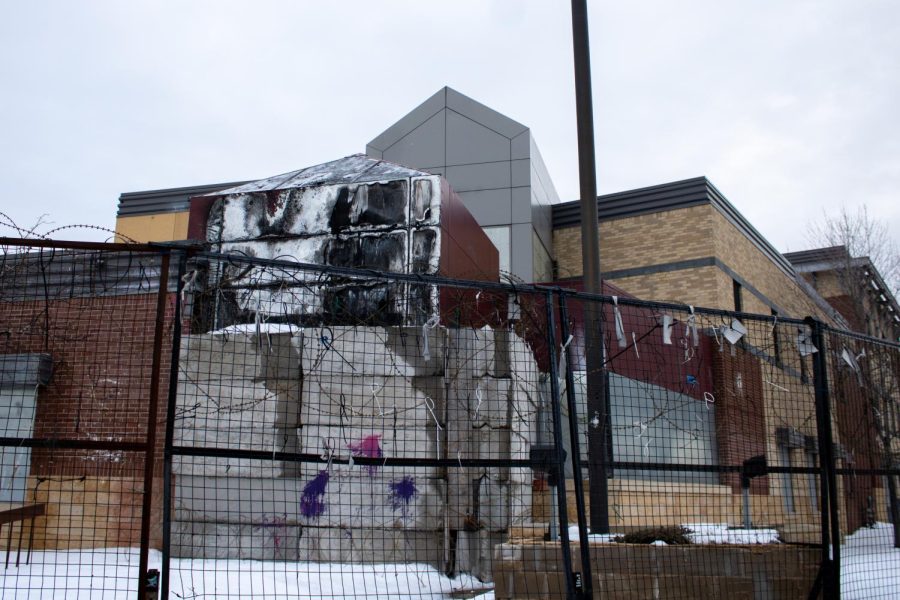Razor wire and barricades surround the former Minneapolis Police Department (MPD) Third Precinct, where black scorch marks on the building’s exterior are scars of a community uprising nearly three years ago.
Now, Minneapolis is planning to hold community discussions to determine the building’s future.
MPD abandoned the former Third Precinct, located at the corner of Lake Street and Minnehaha Avenue, during the civil unrest following the murder of George Floyd by former MPD officer Derek Chauvin in May 2020. The building was then set on fire and heavily damaged.
Since then, MPD officers from the Third Precinct have operated out of a facility downtown.
The city is now considering whether to repair the existing building or build a new facility less than a mile away, according to a statement released by the city on March 29.
“Identifying two viable locations for the Third Precinct building has been an enterprise-wide effort,” Mayor Jacob Frey said in the release. “The next phase of this process will undoubtedly be marked by debate and discussion, but we should all agree on one thing: there should be a Third Precinct building in the Third Precinct.”
Minneapolis held a listening session for business owners on April 11 and three sessions for the general public April 13-19. City officials will analyze the feedback and present reports to Frey and the Minneapolis City Council in May.
In a statement to the Minnesota Daily, MPD Spokesperson Garrett Parten echoed Frey’s calls for a new precinct building.
“MPD believes that the residents deserve a police precinct at a location within the Third Precinct,” Parten said in the statement.
Several Minneapolis activists disagreed.
According to Michelle Gross, the founder of Communities United Against Police Brutality (CUAPB), rather than repair the existing Third Precinct site, city leaders should “raze it.”
“It’s important to the community that we don’t pretend what happened after George Floyd was murdered didn’t happen,” Gross said. “I don’t want to see them tear that down and put up some shiny new Third Precinct.”
Gross said she would be more open to discussing relocating the Third Precinct.
MPD’s Third Precinct had a longstanding reputation for being “very brutal,” with many people complaining about police conduct over the last several years, according to Gross.
From 2007-2017, Minneapolis paid $2.1 million in settlements from lawsuits involving Third Precinct officers’ misconduct, according to reporting from the Star Tribune.
More recently, a 2022 report from the Minnesota Department of Human Rights found MPD as a whole engages in a “pattern or practice of discriminatory, race-based policing.”
“Culture is a top-down phenomenon,” Gross said. “The people at the top shape the culture either by what they pay attention to, what they tolerate, what they accept, what they don’t accept and how they discipline.”
Chauvin received more than two dozen complaints against him throughout his roughly 18-year career with MPD before he murdered George Floyd by kneeling on his neck for nearly 9 ½ minutes, according to CUAPB.
Additionally, former MPD Union President Bob Kroll, who retired in 2021 amid controversy following Floyd’s murder, had more than 50 complaints and 13 lawsuits filed against him during his roughly three decades with MPD.
Toshira Garraway Allen is the founder of Families Supporting Families Against Police Violence (FSFAPV), a support group dedicated to people whose loved ones have been killed by police. She said a new police station in the Third Precinct would cause further damage to a community that is trying to heal.
“Building another police station would be really traumatizing to the community,” Garraway Allen said. “It went down because of the trauma and the pain, so putting it back up there would add more pain, hurt and retraumatizing feelings for the community.”
FSFAPV grew significantly in the aftermath of George Floyd’s murder, going from a local organization to a statewide community, according to their website.
The future of the Third Precinct should be left for the community to decide, Garraway Allen said. Rather than creating a new building for MPD, the site could be used to find a “better solution” for improving MPD’s relationships with Minneapolis communities.
“Riots and all of that kind of stuff were the voices of the unheard — people felt unheard and unseen,” Garraway Allen said. “We were the community being oppressed, and I think [the Third Precinct] should be a space where voices that have been unheard can be heard. That’s where healing starts.”








